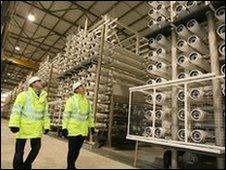Salt water plant opened in London
- Published

The plant will run on biofuels such as used cooking oil
The Duke of Edinburgh has opened what is thought to be the first water desalination plant on the UK mainland.
The facility in Beckton, east London, is part of Thames Water's plan to tackle water shortages in the capital.
It said the £270m centre would deliver up to 140 million litres of water to 400,000 homes in a drought.
The plant will be run by using renewable biofuels such as cooking oil and waste fat in an effort to reduce its impact on the environment.
Drinking water will be produced by treating a mixture of sea and river water from the River Thames.
Thames Water said it built the facility to avoid a repeat of water shortages which hit the South East in 2005 and 2006.
'Energy Guzzling'
However the plant's opponents, which include former London Mayor Ken Livingstone, have accused the company of wasting money.
Mr Livingstone filed a legal challenge in 2005 to reverse planning permission for the plant, claiming it would increase carbon emissions and fail to address the real problem of leakages across London's Victorian waterpipe network.
His successor Boris Johnson withdrew the challenge when he was elected mayor in 2008 and agreed a series of measures with the company to reduce its impact on the environment.
Mr Livingstone said he now acknowledged efforts to save energy had been made but said he was opposed to any carbon-intensive solution to London's water problems.
He added that supplying extra water rather than introducing water meters in every home to change attitudes to water consumption would "feed a wasteful habit".
London Assembly Green Party member Darren Johnson also criticised the plant, branding it "energy guzzling".
He said: "The desalination plant is a sticking plaster solution to London's water shortage problem, which will take the pressure off Thames Water to reduce the capital's appalling leakage rates."
Martin Baggs, Thames Water's chief executive, said: "Our existing resources - from non-tidal rivers and groundwater - simply aren't enough to match predicted demand in London.
"That's why we're tapping into the new and limitless resource of the tidal Thames, fed by the rolling oceans beyond, so we can ensure our 8.5 million customers have enough water in future in the event of a drought."